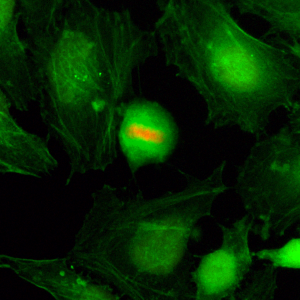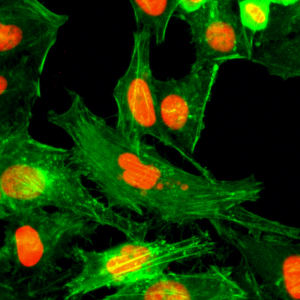
Immunocytochemistry of HeLa cells, using Anti-Phospho-Histone H4 (Ser1) Rabbit mAb RM194 (red). Actin filaments have been labeled with fluorescein phalloidin (green).
anti-Phospho-Histone H4 (Ser1), Rabbit Monoclonal (RM194)
REV-31-1079-00
ApplicationsWestern Blot, ELISA, ImmunoCytoChemistry, Other Application
Product group Antibodies
ReactivityVertebrate
TargetH4C9
Overview
- SupplierRevMAb Biosciences
- Product Nameanti-Phospho-Histone H4 (Ser1), Rabbit Monoclonal (RM194)
- Delivery Days Customer2
- ApplicationsWestern Blot, ELISA, ImmunoCytoChemistry, Other Application
- CertificationResearch Use Only
- ClonalityMonoclonal
- Clone IDRM194
- Concentration1 mg/ml
- Gene ID8294
- Target nameH4C9
- Target descriptionH4 clustered histone 9
- Target synonymsH4-16, H4/m, H4C1, H4C11, H4C12, H4C13, H4C14, H4C15, H4C16, H4C2, H4C3, H4C4, H4C5, H4C6, H4C8, H4FM, H4M, HIST1H4I, TEBIVANED4, TEVANED4, histone H4, H4 histone family, member M, Histone 4 family, member M, histone 1, H4i, histone cluster 1 H4 family member i, histone cluster 1, H4i, histone family member
- HostRabbit
- IsotypeIgG
- Protein IDP62805
- Protein NameHistone H4
- Scientific DescriptionHistone H4 is one of the five main histone proteins involved in the structure of chromatin in eukaryotic cells. Featuring a main globular domain and a long N-terminal tail, H4 is involved with the structure of the nucleosome of the beads on a string organization. Histone proteins are highly post-translationally modified. Covalently bonded modifications include acetylation and methylation of the N-terminal tails. These modifications may alter expression of genes located on DNA associated with its parent histone octamer. Histone H4 is an important protein in the structure and function of chromatin, where its sequence variants and variable modification states are thought to play a role in the dynamic and long term regulation of genes. - Recombinant Antibody. This antibody reacts to Histone H4 phosphorylated at Serine 1. The reactivity is not affected by neighbor Arginine 3 modification. No cross reactivity with Histone H2A phosphorylated at Serine 1. Applications: WB, ELISA, Multiplex, ICC. Source: Rabbit. Liquid. 50% Glycerol/PBS with 1% BSA and 0.09% sodium azide. Histone H4 is one of the five main histone proteins involved in the structure of chromatin in eukaryotic cells. Featuring a main globular domain and a long N-terminal tail, H4 is involved with the structure of the nucleosome of the beads on a string organization. Histone proteins are highly post-translationally modified. Covalently bonded modifications include acetylation and methylation of the N-terminal tails. These modifications may alter expression of genes located on DNA associated with its parent histone octamer. Histone H4 is an important protein in the structure and function of chromatin, where its sequence variants and variable modification states are thought to play a role in the dynamic and long term regulation of genes.
- ReactivityVertebrate
- Storage Instruction-20°C,2°C to 8°C
- UNSPSC41116161








